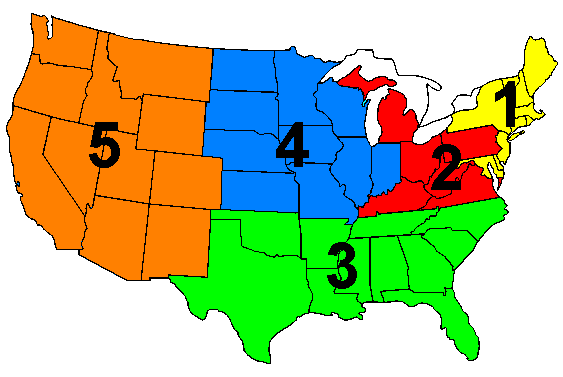
Map of USA divided into five zones used for allocating clear channnels in General Order 40, issued by the Federal Radio Commission in 1928 (source: wikimedia commons)
The Federal Communications Commission has released an overview of its decision-making history that concedes that the government could have done a better job regulating radio in the 1920s and 1930s.
“Although commercial radio produced a Golden Age of programming in the late 1930s, the question remains whether the [government’s] decision to favor corporate-sponsored networks—rather than the multiplicity of diverse non-commercial stations—best served the public interest,” the FCC concedes in an review of its key decisions over seventy years.
The logic of the FCC’s precursor, the Federal Radio Commission, was a bit extreme, in retrospect. The agency, launched in 1927, concluded that the best way to fund the huge “clear channel” stations that it licensed, with their big regional signals, was through advertising sponsors. So the FRC classified those applicants as “general interest” stations, while dubbing the vast majority of non-commercial broadcasters around at the time as “propaganda” stations.
“There is not room in the broadcast band for every school of thought, religious, political, social, and economic, each to have its separate broadcasting station, its mouthpiece in the ether,” the FRC’s Chairman said of those alleged propaganda operations.
The result? In 1926 most stations belonged to civic groups, or colleges and universities, or trade unions. Only 4.3 percent were commercial stations. But by 1934 the vast majority of licenses were now commercially supported (98 percent). Early 1920s proposals like Secretary of Commerce Herbert Hoover’s to fund radio with a two percent tax on receivers were forgotten by all but a handful of media reform groups.
“The FRC performed a valuable service by helping to create commercial networks but did so at the cost of achieving diversity,” the Commission’s study concludes. “Yet, today, there is a strong push to see just such diversity in broadcast programming on radio and television.”
The document is titled “Transformative Choices: A Review of 70 Years of FCC Decisions,” and covers key FCC rulings on AM and FM radio, broadcast television, cable, satellite TV, cell phones, and HDTV.


